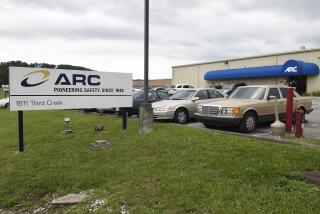Trigger Maker Sees New Boom in Air Bags : Conversion: Special Devices Inc., which made its fortune in the aerospace industry, has replaced lost business by changing fields.
- Share via
Special Devices Inc., a longtime maker of components that trigger the Patriot and Cruise missiles, now wants to put the boom in automobile air bags.
Switching fields could give the Newhall-based company a much-needed boost. With defense budget cuts trimming its market, Special Devices has seen its aerospace sales skid 13% from fiscal 1989, to $17.5 million last year. Its earnings are lagging, and so is its stock, which closed Friday at $10 a share, about where it was two years ago.
By contrast, the market for auto air bags is humming. Because of federal rules requiring U.S. vehicles to have frontal crash protection for drivers and passengers by 1998, analysts estimate the air bag market will reach 25-million units in 1995--five times the number sold last year. And every air-bag unit needs a device called an initiator to ignite the inflater.
“The numbers are just incredible,” says Stan Trilling, a senior vice president at PaineWebber Inc. in Los Angeles. The European air-bag market is potentially even bigger, he said.
Special Devices has been around since 1960, but it was late 1988 when it decided to change directions. That year all of the company’s business came from defense contractors like Raytheon and General Dynamics.
But in its fiscal year that ended Oct. 31, 40% of Special Devices’ sales of $30.1 million were from shipments of air-bag initiators, mostly to TRW Inc., a leading supplier of air bags to the Big Three car makers. This year Special Devices expects 60% of its business to come from its air-bag unit.
*
“If we had never gotten into the automotive business, we would now have 125 people with sales of $13 million,” instead of 480 employees and annual revenue of $30 million, said Tom Treinen, the company’s chairman and president.
The company isn’t out of the woods yet. Despite increased sales of air-bag initiators, Special Devices earned a puny profit of $293,629 in the six months that ended May 2, off 39% from the same period a year earlier and a mere fraction of its earnings of $2.1 million in fiscal 1989.
Analysts say that’s because margins are much smaller selling initiators for air bags than for missiles. Another drag on the company’s earnings are its interest expenses, which are up because its long-term debts--$4 million as of May 2--are double that of a year earlier.
But Treinen, 55, says the company plans to more than double its output of air-bag initiators in 1994, to 6.4 million units. Fueling the increase is a contract with TRW, which Special Devices won two years ago by beating out rivals. That contract calls for Special Devices to make 75% of all TRW’s initiators in the 1994 car model year that begins Oct. 1--up from 50% for the 1993 model year.
“If we make it through model year ’94 and we still have our hide, ’95 isn’t as big a challenge,” said John Cuthbert, head of Special Devices’ automotive products division.
But while the company’s new business shows promise, there are also perils. The domestic air-bag initiator industry is dominated by OEA of Denver, which analysts say has about 70% of the market and whose sales this year should hit $100 million. Special Devices and Imperial Chemical Industries Inc., a $25-billion chemicals company based in London, England, pretty much split the rest of the domestic market.
OEA got an earlier start on air-bag initiators than Special Devices, and that helped it land a contract with Morton International, the nation’s biggest supplier of air-bag systems. Charles Kafadar, president of OEA, declined to comment about Special Devices, saying only: “We have always made more initiators than the rest of the world combined.”
*
Another test facing Special Devices, as well as its rivals, is pressure to reduce cost. Special Devices and others now charge an average of $7.50 per air-bag initiator, said James Spencer, an analyst at Wertheim Schroder & Co. Inc. in New York. But pressure from car makers will drive down the price of initiators, possibly to $5 a unit by 1995, Spencer said. “So they’ll ship more at lower prices.”
This figures to be a real challenge for Special Devices, because so far this year the company’s earnings are only 2 cents per dollar of sales.
Still, Special Devices’ Treinen contends the increase in sales of air-bag initiators should make up for the lower margin of profit. “We’re going to grow with the market,” he said.
For a while anyway, Special Devices is planning to grow alongside TRW. But that contract expires in 1995, and risks abound for any company that relies heavily on one major customer. So far this year TRW has accounted for almost 90% of Special Devices’ automotive business and more than half of its overall sales. Special Devices supplies a small number of initiators to Morton and Allied Signal, a much smaller maker of air-bag inflaters.
Although Treinen is happy to have something cushioning the company’s dwindling aerospace sales, Special Devices could have gotten into the air-bag market sooner. Like its rival OEA, which also makes initiators for missiles, Special Devices always had the technology to make air-bag initiators--which use the same trigger devices for sophisticated missile systems. In both cases, the initiator is made of pyrotechnic materials that are packed in a metal encasing. When a car crashes, sensors in its bumpers send electrical charges to the initiator, which then detonates the air bag mounted into the steering wheel or dashboard.
But Treinen said it wasn’t until the late 1980s that it became clear legislation requiring air bags would pass. “We didn’t jump in earlier because the air-bag business had gone through so many ups and downs,” he said.
Special Devices changed businesses once before. When the company was founded it made tiny explosive devices such as “bullet hits,” which simulate gunshot wounds, and other special effects for the movie industry. By 1970 the company got out of that business and entered the defense market. Treinen says its initiator sales to the aerospace industry remain a profitable and core business, although the company’s future is in air bags.
Still, the conversion from aerospace to automotive wasn’t easy. Special Devices had to go through a rigorous process to get its initiators approved by General Motors, Ford and Chrysler as well as foreign car makers. Altogether, the company pumped in more than $20 million for research and infrastructure, including a $14-million factory in Mesa, Ariz., which can produce 10 million initiators a year--more than three times the capacity of its plant deep in the canyons in the Santa Clarita Valley.
But the Mesa plant is currently running at half production, and according to John C. Lowry, an analyst at Buckingham Research in New York, Special Devices still trails OEA in production costs.
“So far they’ve done a fairly good job,” Lowry said of Special Devices’ new initiator business. But he said, “They haven’t run the millions and millions of units to say they’ve made it. This is going to be a testing year.”
More to Read
Inside the business of entertainment
The Wide Shot brings you news, analysis and insights on everything from streaming wars to production — and what it all means for the future.
You may occasionally receive promotional content from the Los Angeles Times.











